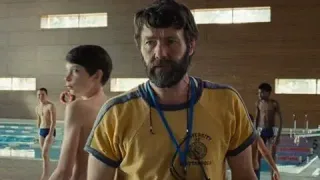January 25, 2022
Karen Mason Lets the Music Play
Gregg Shapiro READ TIME: 12 MIN.
If you've ever listened to a Karen Mason album or been fortunate enough to attend one of her concerts, you can be sure of two things. One, is that you will be blown away by her interpretive skills, and the ease with which she makes even the best-known song all her own. When she sings a song written by her husband Paul Rolnick, she delivers it in such a way as to make it familiar and comfortable as a favorite sweater.
The other thing is that she will make you laugh. Her sense of humor is always on the surface and her laugh is as infectious as can be. If you missed her Norma Desmond in Sunset Boulevard, or other Broadway roles in Hairspray, Mamma Mia! and other musicals, watch her recent acting in the miniseries Halston.
On Let the Music Play (Zevely), her wonderful new album, she lifts our spirits with songs of hope and love at a time when we need it most.
Gregg Shapiro: Before we talk about your wonderful new album Let the Music Play, I'd like to ask you to say a few words about your unforgettable performance as wealthy Texan Mrs. Marsh, alongside Ewan McGregor, in the Netflix miniseries Halston. What was the experience like for you?
Karen Mason: Oh, it was fantastic! For the audition, where I had a great time, I wore my husband's mother's beautiful old, fur jacket. I know it's not totally PC to have these, but they're from our mothers! They're so beautiful and so sweet. I was going to bring my mom's, but I couldn't fit it in my backpack [laughs]. I wore Paul's mom's into the audition, bravely thinking, "just go in and be who that woman is."
It's amazing how those little articles of clothing can trigger all kinds of memories for people. With the casting director, we were just blabbing about our little fur coats that we had from our moms and aunts and stuff. Then to get the job and to be on set with Ewan McGregor and Rory Culkin. They were all so generous and sweet to me.
Doing that kind of a show, when you're starring in something like that, and then suddenly you have thousands of new people coming in on your turf, they could have not been that way, but they were. They were all very generous. Honestly, from the very second that I was with Ewan McGregor, I was like a 16- year-old. He's such a dreamboat! He's so sweet and kind and handsome. It took me back to being a teenager, just gushing like crazy. I had such a great time.
You are someone who made the most of the COVID-19 lockdown by regularly live-streaming performances. What did it mean to you to be able to connect with your followers in that way?
I have to say three things. It was out of boredom. My husband Paul's life didn't change at all because we have a studio in the office.
As a record producer, he'd go into the studio and do his work. His life never changed, and I was bouncing off walls. I really wanted to learn a new skill. I knew from the way that the business was going that self-taping was going to be the future and the present. So, I better start learning something new. I took a couple of classes and then I thought, "Why not just jump in and see what it's like to do it from my living room?"
I started doing these little giglets, as I called them. I was surprised, first of all, by how many people showed up, and were so generous with me. I gave money to Broadway Cares/Equity Fights AIDS, and then also paid my musicians. Even though these were (taken from) CDs from the past, they were tracks Chris (Denny) played on and Barry (Kleinbort) collaborated on. It was lovely to be able to do that, but to be able to actually connect with people far, far away I don't see all the time. (As well as those people) when I'm performing in a town, I don't usually get to see because I'm busy or just living like a nun, trying to be quiet [laughs].
The power of the Internet is overwhelming. It really is. It was a lovely gift to me to be able to just feel like, "Are you out there?" It was a lovely connection to people feeling the same way that I was. I need that relationship. After so many years of live performance, that's my staple and what I've been doing for so long, to not have that immediately, was jarring to me.
To be able to even have that much of a connection, where I'm staring into this little hole in my computer and people are writing back and letting me know that know they're out there and really appreciate what I'm doing, it was very powerful.
The uplifting title song of your new CD is both a celebration and a declaration of beginning to return to normalcy over the course of the pandemic. I think it's one of the first songs I've heard to address the subject and you infuse it with musical optimism.
First of all, musical optimism... I'm a Midwesterner, Gregg! That optimism never goes away, no matter what. It's really funny how this whole thing happened. We started doing Zoom conversations with David Friedman, who co-wrote the song with my husband Paul, and David's husband Shawn (Moninger) every Tuesday.
I've been friends with them, but never close, close friends, and then suddenly we're doing these Zoom meetings and laughing and giggling and getting to know each other and becoming good friends. Paul asked David if he ever wanted to write a song [together]. Paul had this idea going through his head. It was after a period of time, and there was always this glimmer of hope [for things to reopen]. It's gonna happen, and then it wouldn't.
Paul had the "Let the Music Play" hook in his head, and maybe a verse or two. He sent it to David. David finished the song. They collaborated back and forth, and when I heard the song it was everything that I was thinking, everything I was feeling. It's not just music, but music is certainly the engine for me of emotion and expression.
To be able to have a song that really clarifies it for me; what I'm feeling. I've been feeling alone and hopeless, locked into my apartment, not being able to go out [laughs] and be able to connect on a very real, live, in-person, moment with anyone. This song just clarified and expressed it all for me when I heard it. Paul and I had been working on a CD with the idea of doing something with these tracks we had. When I heard the song "Let the Music Play," I had no choice.
To me, that was the title cut, because it said exactly what all of us are feeling. I've done it in performance in Chicago and New York. People are crying over it because they're so ready. It's not going to be getting back to normal. It's going to be getting back to a new appreciation, I think, of the things we couldn't take advantage of during the lockdown. Live performance, going out, sharing. Sharing is such a huge important part of art. We weren't allowed to do that. The song says it perfectly in three minutes.
I'm glad you mentioned your husband Paul's songwriting. He wrote or co-wrote five songs on "Let the Music Play." What does it mean to you to have someone writing songs just for you?
Well, he doesn't write them just for me [laughs]. My ego would like to say, "Yes, of course, it's lovely." Songwriters write to express themselves. Take the song "Jerusalem," for example. He said he had that thought going through his head about Jerusalem and what it meant to him; he's Jewish. The symbolic quality of the word Jerusalem. I'm honored to be able to sing his music. I certainly love the man very much. His soul is as complicated as any of ours. I love to be able to do my part in expressing what he's feeling.
I do very much love the song "Talking to the Moon," which he wrote with Jane Snyder. After my dad died, my mom said, "I talk to the moon about your dad." That song means so much to me! Now that I've lost both of them, I feel like every time I get to sing it, it brings me a little closer to them in a way.
The album includes "Steppin' Out with My Baby" and "Mr. Monotony," a couple of Irving Berlin songs which made me think about how in his lifetime, Berlin also lived through a pandemic, the 1918 flu. Did that have anything to do with why those songs were chosen?
No, but that's a great idea [laughs]. I wish I had thought of that! No, I just like them. My thought process is not as complicated or as insightful as yours. Mine is more like, "Oh, I like that song. It's a pretty thing."
When we go into the studio – this is our eighth CD – sometimes we have extra time, or we're not quite sure which tracks we're going to include, we record more stuff. We record arrangements that we've already done. We had some of these, and I love that arrangement. I love "Steppin' Out with My Baby." It's so sexy and sassy. Chris and Barry did such a great arrangement of it.
Also, with "Mr. Monotony," before the pandemic I had been at the anniversary of the opening night of "Jerome Robbins' Broadway." I was not the opening night company, I took over after Debbie Shapiro, Gravitte left. The company has always included me in everything. So, I was able to be there. I thought, "I like this song a lot." I just wanted to include it. We had recorded it, and I really liked it. Again, it was more of an instinctual thing than a very deep, insightful [laughs] thing or thought.
You have a long history in your live shows and on your albums of fascinating song pairings, including "Somewhere" and "Impossible Dream," "Help" and "Being Alive," "Downtown" and "I Know a Place," "Watch What Happens" and "I Will Wait for You," and, from the new album, "On Broadway" and "Broadway Baby." How does the process work when it comes to making those matches?
I feel very, very lucky that I work with such brilliant artists; Christopher Denny and Barry Kleinbort. [The late] Brian Lasser was certainly one, innovative and fearless with great artistic and emotional sensibilities. For a song to really land, you have to make sure that the story you're telling is clear.
Each song that you go to when you do a combination like that, that each song adds something new. I know other people enjoy other kinds of medleys, but for me, they work really great when each combination will take you to another step.
With "On Broadway" and "Broadway Baby," that's pure Christopher and Barry. I think the way it usually happens is that somebody will go, "I really like this song. Let's try it." Then some inspiration will come to one of them and they'll say, "Oh, try going to here." Then, suddenly, it all just magically comes together. They're beautiful storytellers with an incredible encyclopedia of music at their disposal. That's such a phenomenon to be in the room with.
Then I get to go, "Yes, that works perfectly!" If it's not totally correct for me, if it doesn't logically work for me, they listen to me and appreciate what I'm saying, and we make an adjustment to accommodate what I need as a performer to be able to tell that particular story.
When people hear the name Ira Levin, they often associate it with his scary novels, including "Rosemary's Baby" and "The Stepford Wives," or the stage play and later movie "Deathtrap." But Levin also wrote the book and lyrics for the 1965 musical "Drat! The Cat!." Does Levin's more famous material ever cross your mind when you sing his song "He Touched Me," as you do on the new album?
Actually it would work perfectly with "Rosemary's Baby" [laughs]. The truthful answer is no. But it really is fascinating that he could write such scary, powerful things and then have a song like "He Touched Me," which is so simple and beautiful. But I guess he was a storyteller, and this song is not your typical love song, it's very much about that first moment when their skin hits your skin. I guess I do like stories. They're easier to sing.
Sometimes you have to impose a story on something. To me, the ones that are the most powerful, that resonate with me are the ones I can have a beginning, a middle and maybe an end, maybe not; but have a storyline to tell.
In addition to your new album, you can also be heard singing "Live Alone & Like It," from Dick Tracy, on the various artists album "Sondheim Unplugged – The NYC Sessions: Volume One" [recorded before Sondheim's November 2021 passing]. Did you choose that song, or was it chosen for you?
Oh, no, it was chosen for me. I think there are two or three more [albums in the series] coming along down the pike. He [producer Phil Geoffrey Boyd] recorded a massive amount of Sondheim songs. I recorded three: "Live Alone & Like It," "Being Alive," and a beautiful ballad from "Passion." I will show up on the other CDs, also.
When Phil got in touch with me, I asked, "Can I sing this song?" [He said] "No, Sally Mayes is singing that." "What about this song?" "No, no, somebody else is singing that one." [I said], "Okay, what do you want me to sing [laughs]?"
"Live Alone & Like It" is such a bizarre song, too. In the movie, it's just a song that plays on the radio in the background.
It's a great song. I actually listened to Barbara Cook sing it on a recording of one of her shows. I really do love the song. It was so fun to sing.
Help keep the Bay Area Reporter going in these tough times. To support local, independent, LGBTQ journalism, consider becoming a BAR member.






